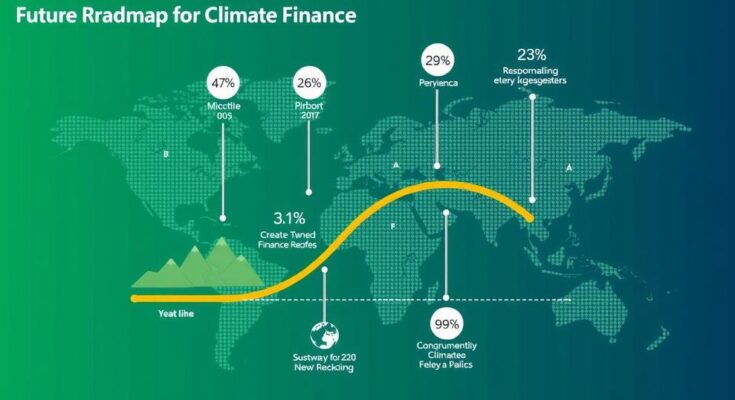COP29 concluded on November 24 with inadequate outcomes on climate finance, revealing a significant gap between developing and developed nations’ commitments. The promise of $300 billion by 2035 is insufficient against the $1.3 trillion required annually, leaving EMDEs vulnerable to climate change impacts. While the establishment of a global carbon market offers hope, comprehensive solutions are needed, expected to unfold at COP30 in Brazil.
The 29th Conference of Parties (COP29) concluded on November 24 with an unsatisfactory outcome concerning climate finance, failing to bridge the significant divide between developed and developing nations. Despite previous pledges, developed countries are now committing to a goal that falls short of the required funding to meet adaptation and mitigation targets. The established New Collective Quantified Goal (NCQG) of $300 billion by 2035 contrasts sharply with the projected $1.3 trillion needed annually by developing countries, highlighting a pivotal imbalance in the global climate finance landscape.
Emerging Market and Developing Economies (EMDEs) face the daunting task of meeting their Nationally Determined Contributions (NDCs) requiring investments of nearly $5.9 trillion. The G77 countries, along with China, advocated for $1.3 trillion in mobilization by 2030, emphasizing the importance of grant financing over loans to alleviate the burden of debt on these nations. However, the COP29 declaration reflects a lack of commitment from developed nations, as it merely encourages all stakeholders to collaborate on achieving these financial goals without imposing responsibilities on wealthy countries.
This situation raises critical ethical questions regarding fairness, as developing countries are disproportionately affected by climate change despite contributing minimally to the crisis. The principles of Common But Differentiated Responsibility (CBDR) remain unaddressed, exacerbating the sense of betrayal felt by the Global South.
Yet, despite the discontent, key developments emerged during COP29. The establishment of a global carbon market under Article 6.4 of the Paris Agreement presents opportunities for increased investments in emission reduction initiatives. Additionally, several nations announced ambitious NDC targets aiming for accelerated progress towards net zero emissions.
Moving forward, attention must focus on the upcoming COP30 in Brazil, where the mechanics of fund distribution to developing countries will be determined. It is imperative that discussions include innovative financing mechanisms such as global solidarity levies and enhancements from multilateral development banks. Urgent prioritization is needed regarding eligible climate finance activities and the formation of credible institutions for data collection to ensure transparency and efficiency in fund allocation.
Developed countries must tenaciously fulfill their commitments, revising timelines when necessary. The current reliance on concessional finance is crucial; without it, EMDEs risk worsening their debt situations. The global community can ill afford another setback in addressing climate change, and there is a pressing need for increased collaboration in technology sharing and concessional capital provision to adhere to the 1.5°C temperature limit.
The COP meetings are central to international climate negotiations, enabling nations to discuss and advance their commitments to combat climate change. COP29, held in Baku, highlighted the ongoing tensions between the Global North and South regarding climate finance, a vital component for developing countries to achieve their climate goals. Historically, developed nations have pledged financial support for adaptation and mitigation efforts in developing countries, but the outcomes of these pledges have often fallen short of the promised levels, leading to frustration among the Global South. The challenges include discrepancies in funding commitments, the need for transparent mechanisms to improve finance flows, and the principle of CBDR, underscoring the differing responsibilities of nations based on their contributions to climate change.
The negotiations at COP29 have underscored the critical need for a re-evaluation of global climate finance commitments, particularly in light of the pressing needs of developing countries. The stark contrast between the promised and the actual funding reveals a troubling disconnect that must be addressed in future negotiations. As we anticipate COP30 in Brazil, the necessity for innovative financing solutions and a firm resolve from developed countries to meet their obligations will be paramount to ensure a just and effective response to the global climate crisis.
Original Source: www.outlookbusiness.com




